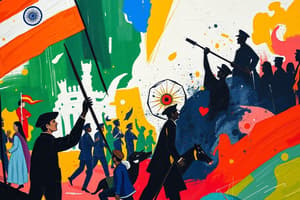Podcast
Questions and Answers
During World War II, the invasion of which country by Germany marked the beginning of the conflict?
During World War II, the invasion of which country by Germany marked the beginning of the conflict?
- Poland (correct)
- United Kingdom
- France
- Soviet Union
Which ideologies contributed to the escalation of World War II?
Which ideologies contributed to the escalation of World War II?
- Communism
- Fascism (correct)
- Socialism
- Capitalism
Which two countries saw the rise and fall of totalitarian regimes during World War II?
Which two countries saw the rise and fall of totalitarian regimes during World War II?
- United States and Soviet Union
- Italy and France
- China and United Kingdom
- Germany and Japan (correct)
What were some of the Allied powers that played a significant role in defeating totalitarian regimes during World War II?
What were some of the Allied powers that played a significant role in defeating totalitarian regimes during World War II?
Which key institutions were established in the postwar period to promote peace and cooperation among nations?
Which key institutions were established in the postwar period to promote peace and cooperation among nations?
What was one of the motivations behind establishing institutions like NATO and the United Nations after World War II?
What was one of the motivations behind establishing institutions like NATO and the United Nations after World War II?
Why did British colonial rulers attempt to partition Bengal in 1905?
Why did British colonial rulers attempt to partition Bengal in 1905?
What was the primary reason Indian nationalists opposed the partition of Bengal?
What was the primary reason Indian nationalists opposed the partition of Bengal?
What impact did the criticism and civil unrest following the partition of Bengal have?
What impact did the criticism and civil unrest following the partition of Bengal have?
How did the partition of Bengal serve as a catalyst for future events in the country?
How did the partition of Bengal serve as a catalyst for future events in the country?
What does the text suggest about understanding cultural, ethnic, and religious divides?
What does the text suggest about understanding cultural, ethnic, and religious divides?
How can examining historical events like World War II and the Partition of Bengal provide valuable insights?
How can examining historical events like World War II and the Partition of Bengal provide valuable insights?
Flashcards are hidden until you start studying
Study Notes
History and Civics: A Glance at Two Pivotal Periods
In this exploration of history and civics, we'll delve into two transformational periods—World War II and the Partition of Bengal—that have had lasting impacts on global politics, society, and international relations.
World War II: Global Conflict and Its Aftermath
World War II was a period from 1939–1945 characterized by unprecedented military conflict involving most major countries across multiple continents. It began with the invasion of Poland by Germany and escalated rapidly due to factors such as fascist ideologies, political aggression, and nationalism. As a result, it led to widespread devastation and profound changes in how nations interacted with one another.
The war saw the rise and fall of totalitarian regimes like Nazi Germany and Imperial Japan, which were eventually defeated through combined efforts of the Allied powers including the United States, Britain, Canada, Australia, New Zealand, France, China, and other nations joining later or serving as resistance movements within occupied territories.
Postwar reconstruction efforts gave birth to key institutions such as NATO, the European Union, and the United Nations, designed to promote peace and cooperation among nations while addressing threats posed by new geopolitical dynamics. These organizations continue to play significant roles today, demonstrating the enduring legacy of WWII and its impactful aftermath.
Partition of Bengal
The partition of Bengal, distinct from the more well-known division of India and Pakistan following independence, took place in 1905 when British colonial rulers attempted to divide the larger Bengal Presidency into Eastern Bengal and Assam and Western Bengal provinces. This decision aimed to develop separate administrative units based on linguistic criteria, thereby facilitating governance and better managing what they perceived as disparate regions. However, the move sparked massive opposition throughout the region, primarily from Indian nationalists who viewed the partition as divisive, arbitrary, and detrimental to their struggle for self-determination.
Following criticism and civil unrest, the partition plan was reversed in 1911; however, it left behind lasting effects and served as a catalyst for future events leading up to the country’s eventual independence. Moreover, the partition highlights the tensions between various groups during India's transition towards autonomy and underscores the importance of understanding cultural, ethnic, and religious divides that still shape our world today.
By examining these historical events—the complexities of World War II and the Partition of Bengal—we can gain insights into critical aspects of human nature, particularly regarding our shared capacity for both cooperation and competition, compassion and cruelty. Understanding this duality helps us further appreciate the consequences of past actions and offers valuable perspectives on present-day challenges, as well as providing inspiration for building brighter futures grounded in empathy, tolerance, and respect.
Studying That Suits You
Use AI to generate personalized quizzes and flashcards to suit your learning preferences.




